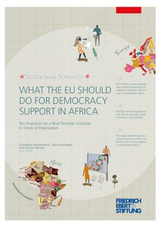
What the EU should do for democracy support in Africa: ten proposals for a new strategic initiative in times of polarisation
Hackenesch, Christine / Julia Leininger / Karina MrossExternal Publications (2020)
published on Together towards Sustainability, 12 June 2020 Bonn: Friedrich Ebert Stiftung
ISBN: 978-3-96250-578-3
Volltext/Document
Future cooperation with African societies will have important implications for the European Union (EU)’s political and economic position in the world. We argue that setting democracy as a core principle of the EU’s foreign relations can contribute to sustainable development in Africa and beyond. Furthermore, it is in the EU’s own economic, security and political interests, as we will outline in this paper. It concludes with proposals on how EU democracy support could be further reformed and adapt-ed in response to changing context conditions:
Proposal 1: Bring democracy support and protection to the core of EU external action and implement this strategic priority in EU foreign relations with Africa (and worldwide).
Proposal 2: Develop a new narrative and more strategic approach to democracy support in a geopolitical context where democracy is increasingly being undermined from within in (former) democratic countries and challenged from the outside by powerful authoritarian regimes.
Proposal 3: Address the impacts of demographic change, urbanisation, digitalisation and climate change on political regimes through EU democracy support.
Proposal 4: Invest more in intermediary organisations (media, parties, CSOs, trade unions, business councils) and in the democratic accountability of sectoral policies.
Proposal 5: Intensify support for civic education and launch new initiatives to strengthen transnational relations between African and European societies.
Proposal 6: Engage more strategically in contexts where authoritarian regimes suddenly open up or where elector-al autocracies gradually close political spaces.
Proposal 7: Continue and deepen cooperation with Afri-can regional organisations and put more emphasis on joint learning and practices for defending democracy.
Proposal 8: Create a different institutional set-up that al-lows the EU to engage more strategically in democratic re-forms.
Proposal 9: Increase the capacities of the European Exter-nal Action Service (EEAS) and the Directorate-General for International Cooperation and Development (DEVCO) to work on democracy support.
Proposal 10: Develop a joint European approach towards democracy support that is sustained by all European countries.



